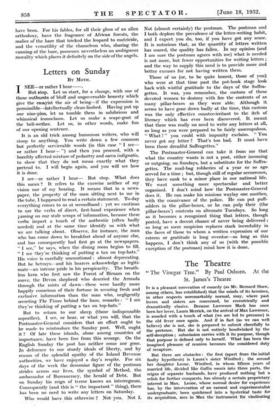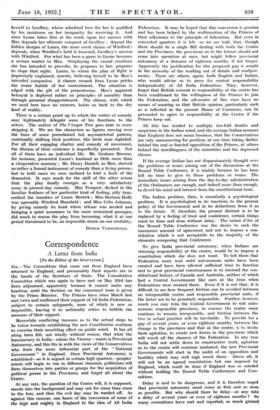The Theatre
" The Vinegar Tree." By Paul Osborn. At the St. James's Theatre IT is a pleasant convention of comedy (as Mr. Bernard Shaw, among others, has established) that the minds of its heroines, in other respects unremarkably normal, may, where past lovers and sisters are concerned, be eccentrically and dramatically elusive. Because Lawrence Mack has once been her lover, Laura Merrick, on the arrival of Max Lawrence, is assailed with a touch of what (we are led to presume) is the old fever once again. And if in fact (as we can well believe) she is not, she is prepared to submit cheerfully to the pretence. But she is not entirely hoodwinked by the self-deception ; submission carries with it its purpose, though that purpose is defined only to herself. What has been the imagined pleasure of reunion becomes the considered duty of recapture.
But there are obstacles : the first (apart from the initial faulty hypothesis) is Laura's sister Winifred ; the second her daughter Leone. Winifred, in whom fifteen years of married life, divided like Gallia omnis into three parts, the reigns of separate husbands, have produced nothing but a relish for further conquests, has already a certain proprietary , interest in Max. Leone, whose normal desire for experience has, by the intervention of an earnest and experimentalist undergraduate, been quickened into a hysterical taste for its acquisition, sees in Max the -instilment for vindicating
herself to Geoffrey, whose admitted love for her is qualified by his insistence on her incapacity for receiving it. And since Leone takes him at his word, upon her success with Max depends her ultimate conquest of Geoffrey : depend the hidden designs of Laura, the more overt claims of Winifred : depends, when Winifred's hold is loosened, Geoffrey's success with Winifred. For what has been a game to Leone becomes a serious matter to Max. Outplaying the casual emotions she has intended to provoke, he proposes to her, prepares to elope that night. Laura, to whom the plan of flight is imprecisely explained, assents, believing herself to be Max's intended companion. A chance remark from Leone pricks . the ironic bubble of her contentment. The situation is edged with the gilt of the preposterous. Max's apparent betrayal is deplored rather on principles of morality than through personal disappointment. The climax, with which we need here have no concern, hoists us back to the dry land of reality.
There is a certain point up to which the writer of comedy may legitimately delegate some of his functions to the actors. The author of The Vinegar Tree goes near to over- stepping it. We see the characters as figures moving over the lines of some preordained but asymmetrical pattern, continually shifting their positions, like birds near nightfall. For all their engaging chatter and comedy of movement, the illusion of their existence is imperfectly presented. Not all of them have an individual life. Mr. Graham Browne, for instance, presented Laura's husband as little more than a vituperative mummy ; Mr. Henry Daniel, as Max, showed us rather a formal instrument of comedy than a living person : but in both cases we were inclined to hint a fault of the dramatist. It says much for the skill of the other actors that the play finally emerges as a very satisfactory essay in present-day comedy. Miss Tempest, decked in the familiar feathers of her particular kind of fooling, ably tran- scribed the inanities of Laura Merrick : Miss Barbara Hoffe was agreeably Winifred Mansfield : and Miss Celia Johnson, by giving comedy its head where release was needed and bringing a quiet assurance to the more restrained passages, did much to rescue the play from becoming, what it at one period threatened to be, an impossible strain on our credulity.
DEREK VERSCIIOYLE.









































 Previous page
Previous page